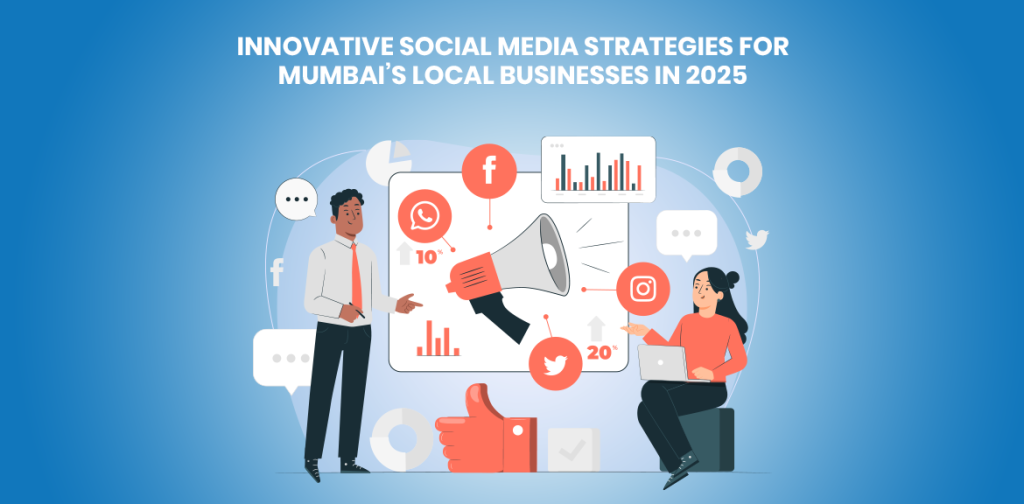Mumbai has long been India’s financial capital, but in recent years it has also emerged as one of the fastest-growing e-commerce hubs. With an increasing number of consumers turning to online shopping for convenience and variety, e-commerce brands in Mumbai are facing fierce competition. To stand out in this crowded market, businesses must adopt effective digital strategies—particularly social media marketing in Mumbai. Platforms like Instagram, Facebook, YouTube, and even LinkedIn are shaping purchase decisions and influencing customer journeys. For e-commerce businesses, leveraging these platforms effectively can drive brand visibility, engagement, and conversions.
E-commerce Growth in Mumbai: How Social Media Plays a Role
The e-commerce boom in Mumbai is fueled by rising internet penetration, a tech-savvy young population, and increased disposable incomes. But growth alone isn’t enough—brands need to capture consumer attention in a city where choices are endless.
Here’s where social media marketing strategies in Mumbai become crucial. Social platforms serve as discovery engines where potential buyers explore trends, compare products, and make purchase decisions. By using tools like shoppable posts on Instagram, carousel ads on Facebook, and product videos on YouTube, e-commerce companies can shorten the buying cycle and increase conversions.
For example, fashion and lifestyle brands in Mumbai often use Instagram Reels to showcase product styling, while electronics companies leverage YouTube unboxing videos to build trust. In both cases, social platforms bridge the gap between curiosity and purchase.
Choosing the Right Social Platforms for E-commerce Marketing
Not every platform delivers the same results, so businesses must carefully choose the right social platforms for e-commerce marketing based on their audience and goals.
- Instagram & Facebook: Perfect for fashion, beauty, and lifestyle brands aiming to showcase products visually and run targeted ads.
- YouTube: Ideal for electronics, gadgets, and tutorials where consumers want detailed product insights.
- LinkedIn: Useful for B2B e-commerce ventures that want to connect with corporate buyers.
- Pinterest: Growing among home décor and DIY audiences, making it valuable for niche e-commerce categories.
The key is not to spread resources thin across every platform, but to focus on where the target audience spends the most time.
Building an E-commerce Brand Identity on Social Media
In Mumbai’s competitive online marketplace, brand identity is everything. Beyond discounts and product launches, buyers are drawn to a brand’s personality and values.
Here are some proven strategies for building brand identity:
- Consistency: Use uniform brand colors, logos, and tone of voice across all platforms.
- Storytelling: Share behind-the-scenes content, customer testimonials, and founder stories to humanize the brand.
- Engagement: Respond to comments and messages quickly—Mumbai shoppers value personalized interaction.
- Localized Campaigns: Create campaigns that connect with Mumbai’s culture and festivals, from Ganesh Chaturthi to Diwali.
By focusing on identity, brands become memorable, which boosts long-term customer loyalty.
Strategies for Converting Followers into Customers
Building followers is one thing, but turning them into paying customers is where e-commerce brands win. Effective social media marketing for e-commerce brands requires bridging engagement with sales.
- Shoppable Posts: Instagram and Facebook allow direct shopping links within posts.
- Exclusive Offers: Sharing limited-time discount codes via stories encourages faster conversions.
- User-Generated Content: Featuring customer reviews and product usage builds trust.
- Retargeting Ads: Using platforms’ pixel tracking, brands can remind users of products they abandoned in carts.
- Call-to-Action (CTA): Clear CTAs like “Shop Now,” “Swipe Up,” or “Limited Stock Available” help guide intent into action.
When executed consistently, these tactics transform social followers into loyal buyers.
Paid vs. Organic Social Media Marketing for E-commerce Brands
A common challenge for e-commerce businesses is striking a balance between paid and organic social media marketing.
- Organic Marketing: This includes regular posts, reels, live sessions, and engagement activities. It helps build authenticity, brand trust, and long-term audience loyalty. However, organic reach is limited due to platform algorithms.
- Paid Marketing: Paid ads allow precise targeting by location (like focusing on Mumbai), demographics, and interests. This method ensures higher visibility and faster results, especially for new product launches or seasonal promotions.
The smartest approach is to combine both. For instance, an e-commerce brand could use organic posts to build community while running targeted paid ads for flash sales or retargeting campaigns. This mix creates sustainable growth and immediate sales impact.
Conclusion
Mumbai’s e-commerce sector is thriving, but only those who strategically leverage e-commerce marketing Mumbai can truly dominate the market. By selecting the right social platforms, establishing a strong brand identity, converting followers into customers, and striking a balance between paid and organic marketing, businesses can ensure sustainable growth. Social media is not just a tool—it’s the new marketplace where Mumbai’s buyers and sellers meet.
FAQs
- Why is social media marketing important for e-commerce brands in Mumbai?
Social media marketing in Mumbai helps e-commerce brands reach a highly engaged urban audience, build trust, and directly drive sales through shoppable posts and targeted ads. - Which are the best social platforms for e-commerce marketing in Mumbai?
Instagram and Facebook are most effective for lifestyle and retail brands, while YouTube works well for electronics and tutorials. Pinterest and LinkedIn also serve niche audiences. - Should e-commerce businesses focus on paid or organic social media marketing?
Both are essential. Organic marketing builds brand trust and loyalty, while paid campaigns ensure faster visibility and conversions. A hybrid approach works best. - How can social media marketing help in e-commerce brand identity building?
By maintaining consistent visuals, engaging storytelling, and personalized interactions, social media helps establish a recognizable and relatable brand presence. - What are the advantages of using social media marketing Mumbai strategies for local e-commerce businesses?
Local campaigns allow businesses to connect with Mumbai’s culture, festivals, and city-specific audience, ensuring higher relevance and better engagement.

